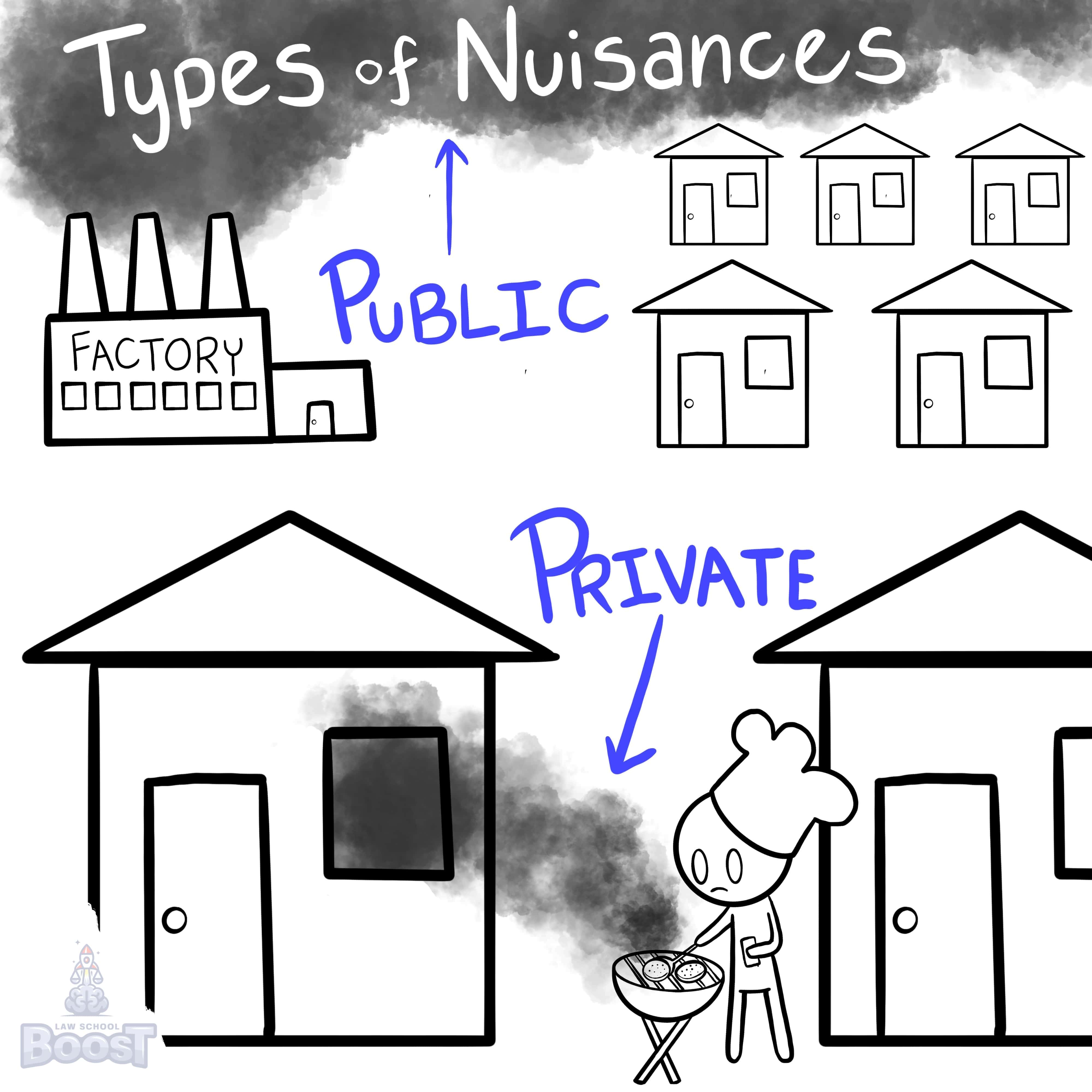👀
Torts • Private Nuisance
TORT#064
Legal Definition
A private nuisance is a substantial and unreasonable interference with another party's use and enjoyment of property. Interference is substantial when it is offensive, inconvenient, or annoying to the average person in the community. Interference is unreasonable when the utility of the defendant's conduct is outweighed by the severity of the injury it causes.
Plain English Explanation
People are generally free to act and do as they please so long as it doesn't harm others, or unreasonably interfere with other people enjoying life. Such a harm or interference is known as a nuisance. A nuisance that causes harm to an individual or small portion of the community is a private nuisance, while a nuisance that causes harm to the entire community is a public nuisance. Common examples of a private nuisance are things that can easily escape the boundaries of one person's property and affect their neighbors, like vibration, soil contamination, odors, noise, and even excessive light.
The law seeks to find a fair balance between the rights of private parties, so it will examine private nuisance complaints to determine whether or not the person complaining is actually being unreasonably harmed, or whether they are just a bit of an overly sensitive complainer compared to the average person in the community. For example, if someone from the city moved to a town surrounding a cow farm, they would likely find the smell to be nauseating. If they tried to bring an action against the farmer for private nuisance, the court would recognize the fact that the average person in the community may not enjoy the smell, but they aren't harmed by it. If you flip this example, though, and have a scenario where a farmer buys land next to a community and builds a cow farm, then the same odor would likely be found to be substantially offensive to the average person of the community.
This community standard aspect of identifying a private nuisance is important, because it allows for communities to change over time. In our first example, where the person from the city moves to a community surrounding the cow farm, the person had no right to bring a private action case because the community was used to the odor. However, if 10 years later, more people have moved from the city and now the average person in the community is offended by the odor, a private nuisance claim may be able to be brought against the farm.
Finally, another important factor courts consider is the utility of the defendant's conduct and whether it outweighs the harm caused to the plaintiff. In other words, a private nuisance may be allowed to exist if the value it provides to the community is more important to the community than stopping the harm caused to the plaintiff. For example, a power plant causes many annoyances and harms to its surrounding neighbors, but the value it provides to the community by providing electricity, and even a source of revenue from selling electricity to neighboring communities, will make it hard for an individual to bring a suit against them based on private nuisance.
The law seeks to find a fair balance between the rights of private parties, so it will examine private nuisance complaints to determine whether or not the person complaining is actually being unreasonably harmed, or whether they are just a bit of an overly sensitive complainer compared to the average person in the community. For example, if someone from the city moved to a town surrounding a cow farm, they would likely find the smell to be nauseating. If they tried to bring an action against the farmer for private nuisance, the court would recognize the fact that the average person in the community may not enjoy the smell, but they aren't harmed by it. If you flip this example, though, and have a scenario where a farmer buys land next to a community and builds a cow farm, then the same odor would likely be found to be substantially offensive to the average person of the community.
This community standard aspect of identifying a private nuisance is important, because it allows for communities to change over time. In our first example, where the person from the city moves to a community surrounding the cow farm, the person had no right to bring a private action case because the community was used to the odor. However, if 10 years later, more people have moved from the city and now the average person in the community is offended by the odor, a private nuisance claim may be able to be brought against the farm.
Finally, another important factor courts consider is the utility of the defendant's conduct and whether it outweighs the harm caused to the plaintiff. In other words, a private nuisance may be allowed to exist if the value it provides to the community is more important to the community than stopping the harm caused to the plaintiff. For example, a power plant causes many annoyances and harms to its surrounding neighbors, but the value it provides to the community by providing electricity, and even a source of revenue from selling electricity to neighboring communities, will make it hard for an individual to bring a suit against them based on private nuisance.
Visual Aids



